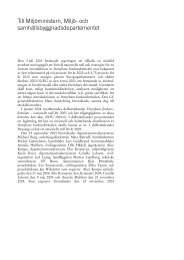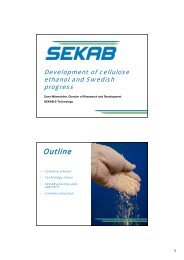Sugarcane ethanol: Contributions to climate change - BAFF
Sugarcane ethanol: Contributions to climate change - BAFF
Sugarcane ethanol: Contributions to climate change - BAFF
You also want an ePaper? Increase the reach of your titles
YUMPU automatically turns print PDFs into web optimized ePapers that Google loves.
Impacts of sugarcane bio<strong>ethanol</strong> <strong>to</strong>wards the Millennium Development Goals<br />
general well-being, the increasing use of marginal land for biofuels cultivation may imply<br />
negative impacts among the most vulnerable such as women. From a poverty reduction<br />
strategy this means that governments should explicitly design their sugarcane bio<strong>ethanol</strong><br />
policies <strong>to</strong> provide the right environment <strong>to</strong> promote business models that maximises rural<br />
development, small farmer inclusion and equitable access <strong>to</strong> ownership and value along<br />
the chain. One example in that direction can be the use of tax-breaks for companies that<br />
include small producers among their suppliers, which is already being used in the context<br />
of biodiesel in Brazil through the PROBIODIESEL programme.<br />
�e impacts of sugarcane bio<strong>ethanol</strong> on food security are less clear. Regarding food<br />
availability and compared <strong>to</strong> other feeds<strong>to</strong>cks, sugarcane bio<strong>ethanol</strong> would provide better<br />
opportunities <strong>to</strong> meet food security as long as it creates less competition for land and crowd<br />
out other crops. However, from an accessibility point of view, it would provide more limited<br />
opportunities <strong>to</strong> the extent that its production is less likely <strong>to</strong> involve small or poorest<br />
farmers. Overall, more research is needed <strong>to</strong> understand these linkages.<br />
From an environmental sustainability perspective, compared <strong>to</strong> other �rst generation<br />
biofuels, sugarcane bio<strong>ethanol</strong> o�ers opportunities <strong>to</strong> achieve one of the greatest reductions<br />
in greenhouse emissions under certain circumstances. However, available estimations need<br />
<strong>to</strong> be revised <strong>to</strong> include the emissions directly and indirectly associated with <strong>change</strong>s in<br />
land use and cover. Similarly, biodiversity impacts linked <strong>to</strong> <strong>change</strong>s in land use and cover<br />
especially those associated with the substitution e�ect appear as crucial environmental<br />
aspects <strong>to</strong> be addressed and more research <strong>to</strong> understand them is needed. Likewise, impacts<br />
on water, especially in the context of dry and semi-dry lands, are other key aspects that<br />
deserve better analysis. Only the adequate understanding and management of these impacts,<br />
using a life cycle approach, will help <strong>to</strong> improve the environmental sustainability of sugarcane<br />
bio<strong>ethanol</strong> and thus achieving the Millennium Development Goal on environmental<br />
sustainability.<br />
In some contexts, the promotion of a sugarcane bio<strong>ethanol</strong> industry can be a very expensive<br />
means of achieving poverty reduction and promoting environmental sustainability.<br />
Governments need <strong>to</strong> conduct a careful assessment of the pros and cons of promoting<br />
sugarcane bio<strong>ethanol</strong> <strong>to</strong> support poor rural communities versus those of other policy<br />
choices. Similarly, from a <strong>climate</strong> <strong>change</strong> mitigation strategy, although under certain<br />
circumstances sugarcane bio<strong>ethanol</strong> shows the greatest greenhouse reductions compared<br />
<strong>to</strong> other �rst generation feeds<strong>to</strong>cks, these should be assessed against the costs and bene�ts<br />
of other policy instruments for achieving the same goal.<br />
Another crucial issue involved in realising the full potential of sugarcane bio<strong>ethanol</strong> is the<br />
building of an adequate set of national capabilities on technical skills, policy implementation,<br />
project management and development of R&D programmes. �ese should come hand in<br />
hand with promoting access <strong>to</strong> technology, credit and �nance as well as the provision of<br />
<strong>Sugarcane</strong> <strong>ethanol</strong> 221












